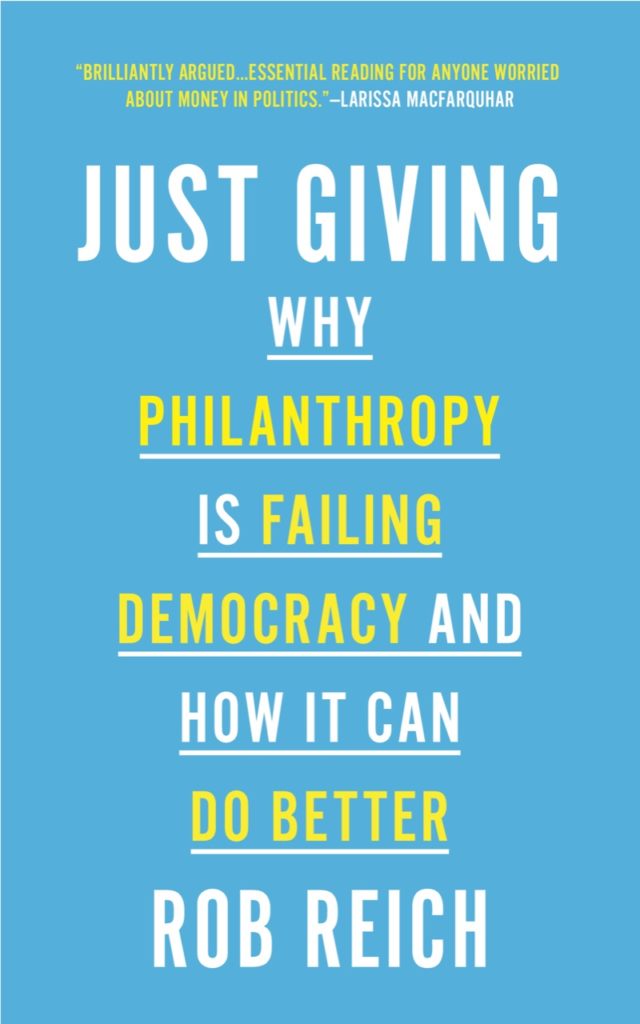Just Giving

Available for purchase at brick and mortar bookstores, Amazon, and Princeton University Press.
Reviews:
“Everyone sees the impact of big donors on political campaigns—but what about unelected big donors quietly experimenting with our schools and neighborhoods, with taxpayer-subsidized money? In this revelatory, brilliantly argued book, Reich shows how crucial it is for a democracy to scrutinize philanthropy. Essential reading for anyone worried about money in politics.” – Larissa MacFarquhar, Staff Writer at The New Yorker
“Rob Reich (no relation) shows how, through the charitable tax deduction, philanthropy is subsidized by the public but unaccountable to the public. So as wealth accumulates at the top and as government reduces its support for many nonprofit activities, decisions by family foundations and wealthy individuals about whom and what to support pose a profound challenge to democracy. Important, lucid, and timely.” – Robert B. Reich, Former Secretary of Labor
“In elegant, lucid prose, Rob Reich invites us to rethink the justification of state subsidies for philanthropy and raises the standard for what counts as just and fair philanthropic practice. This book offers a subtle evolution in paradigms for analyzing political economy by connecting the criticism and justification of philanthropy to an ideal of political equality. The place of philanthropy in our highly unequal society should matter to all of us and this book, rich with compelling insight, should too.” – Danielle Allen, director of the Edmond J. Safra Center for Ethics at Harvard University and chair of the Mellon Foundation Board
“Rob Reich writes with the precision of a political scientist and the perceptiveness of a philosopher, and in Just Giving delivers an essential treatise on the role of philanthropy in our democracy. By combining history, theory, and even-handed critique, Reich challenges us to wield the power of giving for justice.” – Darren Walker, President of the Ford Foundation
“Unlike most studies of charitable giving, which focus on an individual’s motivations or proper objectives, Reich investigates philanthropy from the perspective of the state and society. He seeks to make it a compelling topic for political theory, and in this he succeeds admirably. Anyone engaged in serious philanthropy needs to wrestle with Reich’s analysis, and all will be made—appropriately—uncomfortable by what he has to say.” –Larry Kramer, President of the Hewlett Foundation
“This notable book will be a landmark for political philosophers and legal scholars, as well as policymakers and individuals in the philanthropic world. With its thorough argumentation and sound grasp of legal detail, Just Giving offers a serious treatment of an important area, along with implications for institutional reform.” –Anne L. Alstott, Yale Law School
“Just Giving considers what role, if any, philanthropy should play in a liberal democratic state and develops a political theory of philanthropy from which to evaluate current practices. While other books have addressed some of the issues raised here, no other book has taken the same deep dive into the fundamental questions addressed by Rob Reich.” – Ray D. Madoff, Boston College Law School
Overview:
Is philanthropy, by its very nature, a threat to today’s democracy? Though we may laud wealthy individuals who give away their money for society’s benefit, Just Giving shows how such generosity not only isn’t the unassailable good we think it to be but might also undermine democratic values and set back aspirations of justice. Big philanthropy is often an exercise of power, the conversion of private assets into public influence. And it is a form of power that is largely unaccountable, often perpetual, and lavishly tax-advantaged. The affluent—and their foundations—reap vast benefits even as they influence policy without accountability. And small philanthropy, or ordinary charitable giving, can be problematic as well. Charity, it turns out, does surprisingly little to provide for those in need and sometimes worsens inequality.
These outcomes are shaped by the policies that define and structure philanthropy. When, how much, and to whom people give is influenced by laws governing everything from the creation of foundations and nonprofits to generous tax exemptions for donations of money and property. Rob Reich asks: What attitude and what policies should democracies have concerning individuals who give money away for public purposes? Philanthropy currently fails democracy in many ways, but Reich argues that it can be redeemed. Differentiating between individual philanthropy and private foundations, the aims of mass giving should be the decentralization of power in the production of public goods, such as the arts, education, and science. For foundations, the goal should be what Reich terms “discovery,” or long-time-horizon innovations that enhance democratic experimentalism. Philanthropy, when properly structured, can play a crucial role in supporting a strong liberal democracy.
Just Giving investigates the ethical and political dimensions of philanthropy and considers how giving might better support democratic values and promote justice.